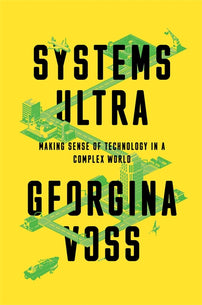Systems Ultra: a Letter from the Editor
One of our January Verso Book Club selections.

Are you one of those people who like to know how something works? Does your mind wander when you think about the ways our lives have become increasingly determined by tubes, wires, waves and bodies? It is another step to think about how these infrastructures interweave, network and combine. It is very hard to keep so many moving parts in mind —they are both very small, and impossibly large at the same time. This is something that Timothy Morton called the Hyperobject. Another way of thinking about this is by considering the omnipotence of systems in our everyday lives. But rarely do we stop and think about how the history, scale, design, material and misuse of these systems make up the often-overlooked architectures of power that make up the modern world.
Systems Ultra, in my opinion, is the most thrilling book that explains something incredibly complex and makes it visible, and then shows us why —as political thinkers —we need to take this very seriously.
Take this example. Do you remember when the largest container ship in the world, the Ever Given, was pushed by head winds into the bank of the Suez Canal and got stuck for six days? Within hours, (via one system) it became a social media meme and an actual living metaphor for all of civilization’s follies. But it was also reflective of the global shipping systems. With the canal blocked, containers were forced to wait in the bay, the knock-on effects unexpected and difficult to calculate. Just-in-time supply chains ground to a halt. The domino effect lasted for months. Fortunes were lost.
It is often only when something breaks down, Georgina Voss reminds us, that we see how fragile it actually is. She shows how, once the ship was unblocked and able to motor down the canal again, the impact then hit the ports, which became clogged up with ships and goods.
But these systems have more permanent impacts on our lives. The end destination of Ever Given was Rotterdam, which is a city that has been transformed by the scale and demands of the global shipping network. Containerisation in the1960s had a huge influence on what could be carried. These ships are now so vast —floating tower blocks —that the old wharves of the city port are no longer used, but rather a new port has been created to cope with scale. Which now are deeply complex, computerised zones. Furthermore containerisation also influences the infrastructure that goes from the wharf-side to the railways and road systems, factories and supply depots, that bring —say —your Amazon packet within 24 hours of ordering it (via your phone on 5G or through a wifi connection).
Now try and unpack the political flows of power within these complex webs of systems. That is the sheer brilliance of Systems Ultra. Shannon Mattern, the author of the groundbreaking Code and Clay, Dirt and Data, sums up the book brilliantly: "With an ethnographer's eye, a comedian's wit, and a travel guide's sense of adventure, Georgina Voss steers us through the docks and control rooms, the convention halls and design studios, the interfaces and archives from which we can glimpse the global systems that constitute and actuate our contemporary world."
This is foremost a book of stories that help to explain the world: a tech conference in Las Vegas, an art exhibition in Belgium, a porn convention, a developer’s studio in Rotterdam. And as a result, it is always a very human story. It is a quest to understand how we have used systems to try and understand the world. But also, how these have often become subsumed by capitalism, and got beyond our reach. Sometimes systems can tell one story but only to conceal another. It is also a warning about how precarious systems can be, and what happens when they break.
Georgina Voss is the perfect guide to this strange new way of thinking about the world. She is ideally placed to think about both the technical and the political implications of complex systems, both as an engineer as well as an artist who works across media from performance, writing and design. Her work has been exhibited at TAC Eindhoven, Tate Modern, The Design Museum, London Design Festival, Vienna Biennale, V&A Museum, and Future Flux Festival (Rotterdam). She has written for The Atlantic, The Guardian, and Harvard Design Magazine. She is currently Director of Supra Systems Studio.
So, Systems Ultra offers something different for the curious Verso reader. It looks at the ways that power and politics both create and are created by the technical systems that we have built around ourselves. I hope you enjoy it.
Leo Hollis, Editorial Director
London, December 2023
Systems Ultra: Making Sense of Technology in a Complex World by Georgina Voss is one of our January Verso Book Club reading selections. Find out more about the Verso Book Club here.
[book-strip index="1" style="buy"]
